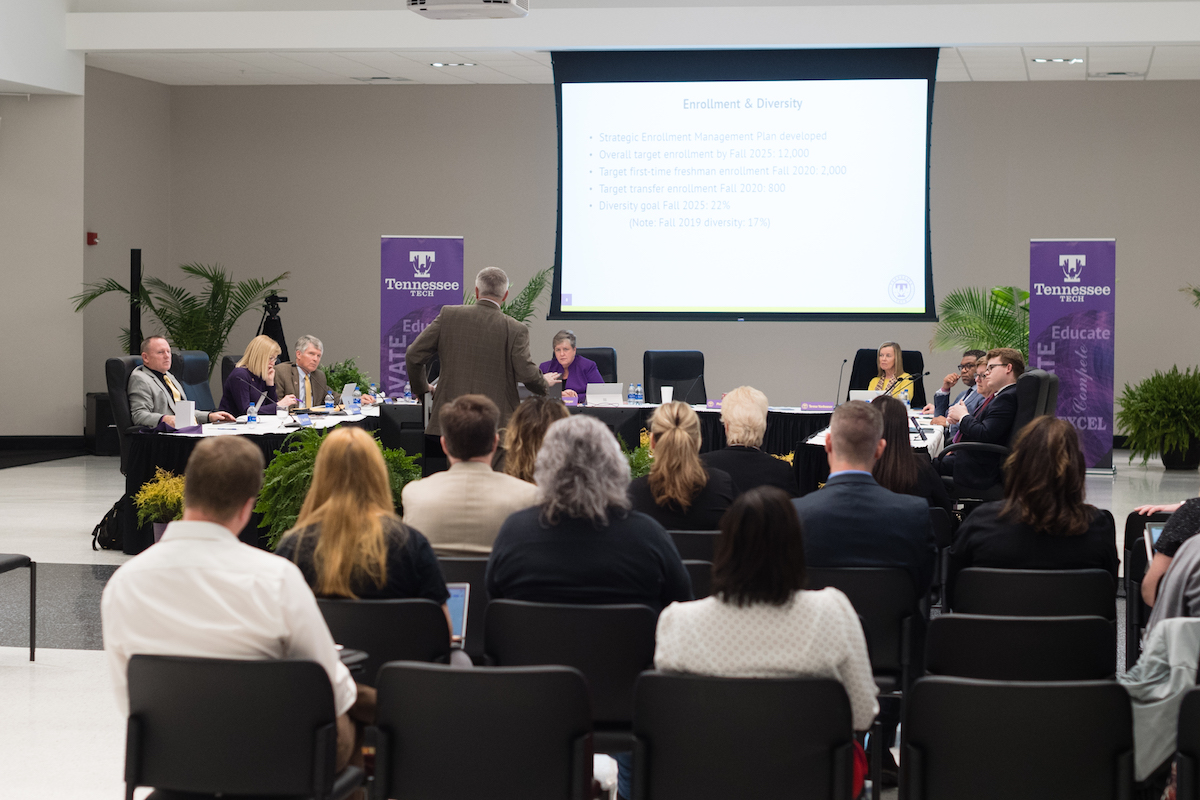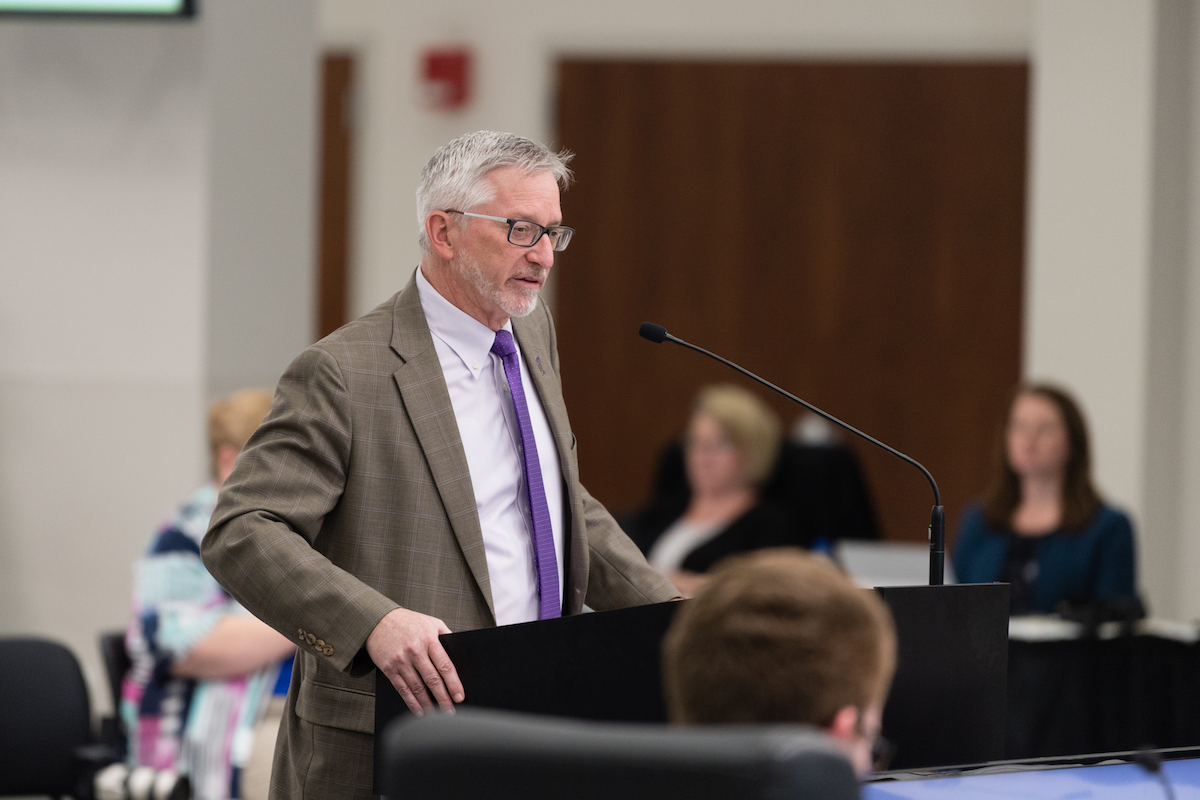Tech Board approves Tech Promise scholarship, adopts flat-rate tuition model
 The Tennessee Tech Board of Trustees approved two new ways to help Tech students and
their families: the Tech Promise scholarship and a flat-rate tuition model.
The Tennessee Tech Board of Trustees approved two new ways to help Tech students and
their families: the Tech Promise scholarship and a flat-rate tuition model.
“The combination of lowest debt of any public university in Tennessee and highest starting salary is a powerful reason for the success of Tech students,” Oldham said. “Our recent initiatives –flat-rate tuition, Tech Promise scholarship and reduced out-of-state tuition – when boiled down, is a simple message that benefits students: graduate sooner, pay less and earn more.”
According to data from Payscale.com, Tech graduates have the highest average starting salary of any public university in Tennessee, and second highest of any university in the state. They also have the lowest average debt of any university in the state, according to data from the U.S. Department of Education's College Scorecard.
New Tech Promise scholarship
The Tech Promise – a new last-dollar scholarship to help make sure high-achieving, low-income students have access to the opportunity that a Tennessee Tech education represents – was approved by Board and will start this fall with students new to Tech, incoming freshmen and new transfer students.
“Tennessee Tech is one of the top schools in the state with regards to social mobility,” Tech President Phil Oldham said. “By alleviating some of the financial concerns faced by low-income students, we wanted to make sure that these talented students weren’t kept away from the promising future a Tech degree will open up to them.”
The Tech Promise is a four-year scholarship and will cover tuition and mandatory fees at Tennessee Tech for eligible students. It is a last-dollar scholarship, meaning it will cover the cost of tuition and mandatory fees not met by other financial aid.
To be eligible, a student must be a full-time undergraduate, receive the Tennessee HOPE scholarship, receive any level of federal Pell grant, and have a family adjusted gross income under $40,000.
“Often, this type of student – high achieving but from a low-income situation – will assume that a Tennessee Tech education isn’t available to them, even though that is not the case for so many. As a result, they don’t even apply,” Oldham said. “We wanted to remove this barrier to make sure these students know they have access to a high-quality Tennessee Tech education that will help them change their lives.”
Students will not have to complete a separate application for the Tech Promise. The university’s financial aid office will determine if a student is eligible using information it already has as part of a student’s application. If a student is eligible, Tech Promise will automatically be awarded to them.
New flat-rate tuition model
The board also approved Tech’s new flat-rate tuition model, which provides a single price for full-time tuition, letting students take 12 credit hours or more per semester at the same flat rate. This new rate comes into effect for new students to Tech, either incoming freshmen or transfer students.
For current continuing students, there will be no increase in tuition and fees (both mandatory and non-mandatory) for 2020-2021.
This is a key component of Tech’s desire to make college costs as transparent as possible so students and families can better predict what college costs and better prepare.
Other parts of this simplified pricing initiative include two items approved by the board last December: reduced and flat out-of-state tuition; and a simplified mandatory fee structure.
Along with making it easier to budget for college, the change should also help more students graduate on time.
“To stay on schedule with most of Tech’s majors, students need to average 15 credit hours per semester,” Oldham said. “But with the federal definition of full-time student being 12 credit hours per semester, we have seen a gap form where more students need a fifth or even sixth year to graduate.
“Research has shown that students who take 15 credit hours or more tend to be more successful in their classes,” Oldham said. “And they also are more likely to graduate on time in four years.”
Tech has set a goal to increase four-year graduation rates to 50% by 2025, and sees this new tuition model as a new, powerful tool to help achieve this goal. Tech’s current four-year graduation rate is 37.2%. According to the National Student Clearinghouse Research Center, the national average for four-year graduation rate among public institutions is 37.7%, while the national average for private institutions is 56.4%.
The flat-rate tuition will be indexed to the cost of 15 credit hours for any number of credit hours, 12 and above. Part-time students, who are undergraduates taking 11 or fewer credit hours a semester, will continue to pay on a per credit hour basis.
Trudy Harper, chair of the board, after the vote was taken on these two items, said “I think we just approved something very important, something really impactful for our school and our students.”
In other business
- Students from the Early Intervention and Mechanical Engineering (EIME) program, which pairs engineering students with families with special-needs children in the Upper Cumberland region to design assistive devices. The student group created a custom-made hybrid spinal support to help a little girl with cerebral palsy.
- University Advancement reported that more than $5 million in private funding has been raised for the new engineering building. Tech is required to provide more than $8 million in funding for the $55 million facility.
- The board learned that Tech has added numerous new academic minors and certificates to serve both students seeking degrees, in the case of the minors and certificates, as well as professionals looking for additional skills via certificates. New graduate-level certificates include Online Teaching and Design, Banking and Financial Services, and Cyber Management and Analytics. In order to earn a graduate certificate, a person is not required to be seeking a graduate degree.
- Enrollment Management reported about efforts to enhance student recruitment, including an additional admission counselor who will focus on diversity recruitment, and collaborations between the Office of Admissions and the colleges of Education, Engineering and Interdisciplinary Studies, who have all added recruitment-focused positions to their college staff. Overall, applications and admitted students are up over this time last year.
- The new fitness center, which is almost complete, will be named the Student Recreation Center, with the current fitness center (commonly known as The Fit) being renamed the Academic Wellness Center as it will now primarily serve as an academic building in support of the College of Education & Human Sciences’s Department of Exercise Science, Physical Education and Wellness.
- The new lab sciences building, which is expected to be completed next fall, will be known as the Laboratory Science Commons. In previous board action, the large auditorium building part of the project was named Stonecipher Lecture Hall.
- The realigned 8th Street on campus will be renamed Wings Up Way as it now serves as a connector between 8th and 9th streets.
Materials from today’s meeting and the webcast of the full board meeting are available at the board’s website, www.tntech.edu/board.
The board’s next meeting is June 23, 2020.



